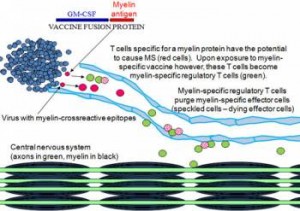One of the great hopes associated with genetic research is the goal to combat disease. With the human genome project completed it is now possible to look at new therapies. The work remains large and seems to be overwhelming, but a new vaccine for MS represents a major triumph. MS has been an illness that has devastated individuals and their families. It also has vexed and frustrated researchers and health professionals. Immunomodulating therapy with interferon has been able to make a difference in the quality of life for many patients, but so far it has been a seemingly impossible dream to find a vaccine that is safe and effective.
Montreal research, which has been published in August, confirms that the vaccine works by reducing the numbers of the immune system cells attacking the nerve fiber sheath. MS belongs to the groups of autoimmune diseases, meaning that cells of the own immune system turn against other body cells and destroy them. The challenge has been to stop these cells. So far immunomodulators have been looked at as an answer to this problem. This breakthrough represents a first in the history of medicine where a DNA vaccine will be used in the treatment of an autoimmune disease, which is MS.
Other autoimmune diseases are lupus or rheumatoid arthritis. No vaccine is available for these diseases, but the first DNA vaccine represents hope for many, that more therapies will become available.
As this review shows, the DNA vaccine experiment against MS failed, because in clinical trials it did not stop MS lesions from growing: http://multiple-sclerosis-research.blogspot.com/2012/01/research-myelin-dna-vaccination-and.html
More information about MS: http://nethealthbook.com/neurology-neurological-disease/multiple-sclerosis/
Reference: National Review of Medicine, August 30, 2007, page 10
Last edited November 3, 2014






